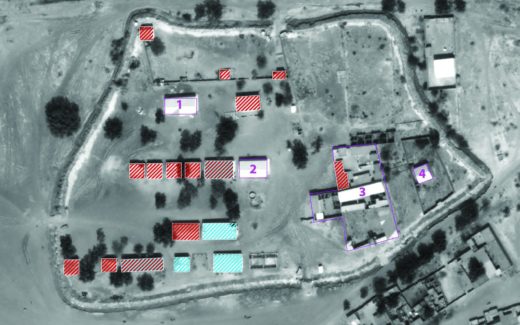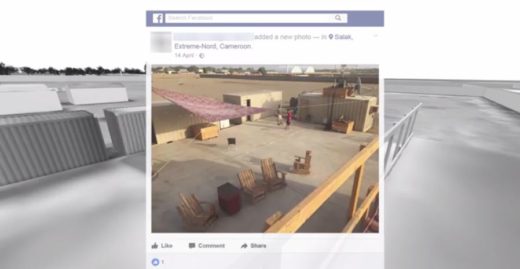A HEFTY RESPONSE TO AN ALREADY BLOODY CRISIS
Children abducted. Villages looted and razed to the ground. Boko Haram has been unleashing havoc in Cameroon’s Far North region. In the face of rampant violence and atrocities, the Cameroonian government has rightfully responded, but with a ferocity that has shattered the lives of ordinary people.
For those living in the Far North, fear of Boko Haram’s attacks has now been coupled with the fear of the very government that is meant to protect them. The Rapid Intervention Battalion (BIR)—Cameroon’s army elite unit–and the General Directorate of External Research (DGRE) are part of the military operation fighting against Boko Haram.
The victims of Cameroon’s crackdown against alleged Boko Haram members, as documented by Amnesty International, in its report “Cameroon’s Secret Torture Chambers”, are mostly Cameroonian men between the ages of 18 and 45 from the Far North region, Muslim, Kanuri ethnic group. Some of the detainees include women, children as young as seven and people with mental or physical disabilities. The majority are arrested on the basis of little to no evidence, some were arrested simply for failing to show their ID. In the 101 cases documented, most were arrested in the Far North region and all without a warrant and without any clear explanation of why they were being arrested.
In our report we documented the cases of over 100 people, including children, have been arbitrarily arrested, tortured and some were killed in undisclosed locations right under the noses of high-ranking Cameroonian military officials.
I was in so much pain that at one point I asked them to kill me so I’d stop suffering
A farmer arrested in Mora
They beat me several times with the wooden plank, which had a nail stuck into it.
A man from the far north of Cameroon
Tell the Cameroon government to stop torturing in the name of security
In Cameroon, the authorities are illegally detaining and torturing people, and some are not surviving.
Why are they doing this? Because the Cameroon government is fighting a war against the armed group Boko Haram. They will stop at nothing to win, including arresting people and torturing people suspected of supporting Boko Haram until they confess. This means that if you find yourself in the wrong place at the wrong time in the Far North region of Cameroon, you run the risk of being arbitrarily arrested, tortured and even killed.
Many of the victims are men from the Kanuri ethnic group but victims also include women, minors and people with mental disabilities. They are taken to often illegal detention facilities, and are tortured, humiliated, intimidated and punished. They are beaten with sticks, electric cables and machetes, forced into stress positions for days, and subjected to suspensions and drowning. Some don’t survive the torture.
The details are chilling and are made worse by the fact that many have been arrested with little or no evidence.
The Cameroon government should do everything in its power to protect the population, but not at the cost of human rights.
President Biya has the power to stop this, please sign the petition and call on the president to:
- Publicly order the security forces to end the practice of torture and secret detention;
- Ensure all detainees can freely access a lawyer of their choice, their family and medical care;
- Grant independent international monitors unhindered access to all detention facilities and people imprisoned;
- Conduct prompt, thorough, independent and impartial investigations into all allegations of torture, incommunicado detention and other cruel, inhuman or degrading treatment in all places of detention.
With your support, we will be able to put pressure on the Cameroon authorities to respect the rights of the people in their fight to keep the country safe.
Allegations of torture

DETAINED AND TORTURED OFF THE GRID
Through our research, Amnesty International was able to identify at least 20 sites in which incommunicado detention and torture occurred between 2014 and 2017. These sites involve BIR headquarters in Salak, DGRE facilities (“Lac”), a private residence and a school. On average, a detainee could spend 227 days in an unofficial detention centre, although some have exceeded 900 days.
Torture in these unofficial detention facilities, particularly in Salak and DGRE ‘Lac’, is routine. It is used to extract confessions, intimidate, and instill fear, says Fatima*, a former detainee: “[The soldiers] beat me for three days all over my body, especially on the soles of my feet, with all sorts of objects, in order to make me admit things I knew nothing about”.
During these periods of long and secret detention, many of the detainees experienced various forms of torture. Amnesty International documented 24 different torture methods which include beatings, stress positions, hangings and drowning. “I spent at least 23 months at the DGRE in Yaoundé, held in secret. I came to know every type of torture there and I was constantly chained up by my hands and feet,” said a 35 year-old Nigerian man who was arrested in Cameroon in 2013.
During the whole time I was detained at Kousseri, Salak and Yaoundé I was not
A former detainee, father of seven and trader from Kousseri, who was arrested in late 2015 and held in secret for over 7 months in various facilities including Salak.
able to see my family or a lawyer. No one knew where I was, everyone thought I
was dead.

PSYCHOLOGICAL TORTURE
Those held in the illegal detention facilities slept on floors and could only urinate and defecate in a bucket within their cell. There were no fans and there was no fresh air as the windows were blocked. Yet, there could be as many as 70 inmates in a 9×5 metre cell, “It was horrible. We were treated like animals,” says Rani*, a man from the Far North Region of Cameroon.
Madi*, a man in his 50s was detained without any contact to the outside world for almost six months in the BIR military bases in Kolofata and Salak, and in a building of the State Defence Secretariat (SED) in Yaoundé. After being sleep deprived for the first 24 hours of his detention, tied up with ropes and beaten, he was subjected to a mock execution.
The adjutant asked [his men] to look for a pickaxe and a shovel to dig a grave.
null
They dug the grave within the camp and threw me into it. They loaded their
guns. I waited to be killed.
“The adjutant asked [his men] to look for a pickaxe and a shovel to dig a grave. They dug the grave within the camp and threw me into it. They loaded their guns. I waited to be killed”.
Soldiers, guards and interrogators often used other forms of mistreatment which include mocking, stripping victims naked and leaving them in front of others for hours or days; and forcing detainees to lie on cold or wet floors. After spending three hours with their face to the ground, “a soldier came close to us and asked: ‘Did you guys eat anything?’ I replied we didn’t. And so he said: ‘No problem, we came to bring you some coffee’ And he started beating us again savagely,” recalls a man who was arrested in late 2014.
Witness the horror of Cameroon’s secret torture chambers

CLASSROOMS TURNED INTO TORTURE CHAMBERS
Among the unofficial detention centres where torture was carried out is a school in Fotokol. The BIR began using the Public School number 2 of Fotokol in May 2014. While the school was not being used by children due to the hostilities between Cameroon and Boko Haram, it did re-open in November 2016. The school was still partially used by the BIR as of June 2017, with detainees held there.
The satellite imagery analysis shows the proximity of the detention centres to school building. Buildings highlighted in red show where detainees were held, buildings in blue are school facilities and those highlighted in purple held both students and detainees.
The use of a school by military forces makes it a potential military target during hostilities and puts children’s lives at risk.
We could hear people crying while they were tortured in the classrooms, but
A man from the far north of Cameroon
also, sometimes, there was a disturbing silence.

DEATH FROM TORTURE
Several detainees witnessed the death of Boukar*, a 36-year old man from the Far North region of Cameroon, following repeated torture by DGRE agents in June 2014. “He died, his arms and feet chained up to the bed where he was lying down. Boukar was only wearing his underwear because his body was so covered in injuries caused by the torture he suffered that he couldn’t even wear clothes,” testified one of the detainees who was present when he died. Boukar’s father died of a heart attack a few days after learning of his son’s death.
INTERNATIONAL PRESENCE ON SITES
Cameroon is not alone in its fight against Boko Haram. The government is actively being supported by numerous countries in terms of military assistance— including the USA and France. Several detainees’ testimonials confirm the presence of Westerners in Salak, including Americans “I saw white men in Salak many times and I heard them talking in English. I think they were Americans. Everyone said they were Americans,” says a former detainee who was held in Salak between February and July 2016.
Given the extent of the overlap, the US government and other international partners should investigate the degree to which its personnel were aware of illegal detention and torture at Salak, and whether they took any measures to report it to the Cameroonian authorities.
The coverup ends here
There is not enough evidence to say categorically that high-ranking officers were directly involved in torture or ordered their personnel to carry out torture. However, the scale and frequency of the violations suggest that it would be improbable for high-ranking officers to have been unaware of what was happening. In addition, torture would happen in the same building where the offices of high rank commanders are located and some as near as 110 meters from cells were detainees were held.
Furthermore, as many as 10 victims and other eyewitnesses identified DGRE agents including a commissioner as being present during the interrogations that involved acts of torture in Salak and DGRE “Lac”.
Cameroon must protect the rights of its citizens amidst its fight against Boko Haram. The government must call for a thorough, effective and impartial investigation into the incommunicado detention, torture and deaths in these unofficial centers. Those responsible for such acts should be brought to justice in fair trials without the recourse to the death penalty. All unofficial detention facilities must be closed.

